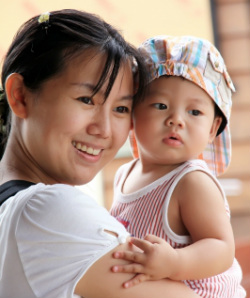 Taken from Grow Up Reading (website) Emergent literacy: Use proper vocabulary when you talk to your baby. For example, say “toes” instead of “piggies.” This helps your child learn the rules of language with minimal confusion. Babies use gestures to communicate before they can talk. Encourage your baby to use simple gestures and signs (such as clapping for saying “please,” or touching their chest to say “thank you”), which can increase a baby’s understanding of language and accelerate language development. Help your baby hear the different sounds that make up words (phonemic awareness) by saying or singing nursery rhymes. Rhyming words share similar sounds—”dock” and “clock” in the classicHickory, Dickory, Dock, for example. Nursery rhymes place rhyming pairs of words in prominent positions to naturally draw a child’s attention to these sounds. By hearing pairs of rhyming words, babies begin to understand that words are made up of separate sounds, a critical reading skill. In addition to reading traditional picture books, use interactive books: books with flaps, textures, smells, and sounds to encourage exploration and stimulate your baby’s senses. Point to images on a page and name them; this helps increase vocabulary. Also talk about what is going on in the story; this helps develop comprehension skills. Use dialogic reading when you read aloud. The basic premise of dialogic reading is adults and children having a conversation about a book. Ask your baby “what” and “why” questions about the story, pause, and then answer your questions. Introducing this type of reading and questioning early will help your child become more comfortable with the process of dialogic reading when he or she is actually using words. Cognitive development: Play with toys that react, pop up, make noise or move to help your baby understand cause and effect. Between 9 to 12 months, most children will begin to play independently with toys and enjoy toys that react or make noise. Babies this age will begin exploring objects in many different ways (shaking, banging, throwing, and dropping) and begin to use objects correctly (shake a rattle, drink from a cup, listen to a phone). Play peek-a-boo games. Young babies have not developed a sense of object permanence—the understanding that unseen objects still exist. Start by hiding your face behind a blanket and then peeking out at baby. Put a scarf over your head and let your baby pull it off; hide objects underneath boxes and let your baby knock the box over to retrieve the object. Motor development: Give your baby plenty of freedom to move around on the floor. Young infants need to spend time on both their back and stomach in order to develop the muscles for the significant motor development that takes place in the first 15 months. Spending too much time in an infant swing or seat will hinder development of motor skills. Continue with lots of floor play as your child grows and begins crawling and walking. Add climbing challenges such as cushions, ramps, and tunnels to refine gross motor skills. Games that further develop hand-eye coordination and fine motor skills include building and knocking over block towers; covering and uncovering containers; taking toys apart and putting them back together again; picking up balls or objects in motion; turning knobs and pages of a book; scribbling and finger painting; and making shapes out of clay. Social and emotional development: Play finger and hand games like pat-a-cake and peek-a-boo; encourage your baby to imitate these gestures. Gesturing is a way babies communicate before talking. When you respond to your baby’s gestures, you reinforce his efforts to communicate. Sing songs with your baby. Music stimulates the cognitive and emotional areas of the brain. Encourage dramatic play through imitation of your actions in everyday activities—household chores, hobbies, entertaining, etc. Tell your baby what you are doing and prompt him to imitate you. Pretend play helps refine motor skills and foster a sense of accomplishment. Read books about daily routines such as brushing teeth, washing hands, putting on shoes, and taking a bath. These books encourage children as they prepare to learn and master these actions.
0 Comments
Leave a Reply. |
Categories
All
Archives
March 2024
LinksFree Children's Stories |

 RSS Feed
RSS Feed
